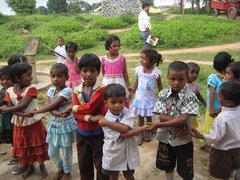
Photo credit: Aishwarya Pillai
In May 2013, POSHAN (Partnerships and Opportunities to Strengthen and Harmonize Actions for Nutrition in India) hosted a meeting, bringing together various networks that are working to mobilize research evidence on nutrition in India.
Following the meeting, a Nutrition Knowledge Conveners Network (NKCN) was established on the Eldis Communities website in September 2013. Formed in response to suggestions that a virtual community be established to serve as a knowledge-sharing platform, the objective of the network is for key stakeholders to share lessons learned, promote linkages, and reflect on the best strategies for nutrition knowledge mobilization.
Mr. Gopi Ghosh from the Food and Agriculture Organisation (FAO) initiated the first discussion on the issue of engaging stakeholders in knowledge mobilization. Participants exchanged perspectives on how India can strengthen knowledge mobilization to support development.
There was a rich discussion on the factors that facilitate, as well as inhibit, stakeholder engagement in knowledge mobilization. Contributors emphasized it is essential that stakeholders believe in the principle and strength of knowledge mobilization and are self-motivated to remain engaged in discussions in both virtual and physical networks.
Accurately identifying stakeholders encourages the presentation of information in user-friendly formats that meet both stakeholders’ needs and preferences, suggested the participants. This, in turn, increases the likelihood that stakeholders will apply knowledge that has been generated within the network.
Participants also believed that it is important for knowledge to reach those who can apply it in practice; political and scientific knowledge alone is not sufficient. It is, therefore, essential to engage the people working at the operational level. However, at present, there are no forums or knowledge platforms geared towards the needs of those working on the ground and in the field.
At the same time, participants cited several barriers to maintaining stakeholder engagement, including limited government participation, a lack of credible data, a lack of financial sustainability, and the under-promotion of a spirit and culture of sharing. Efforts to overcome these barriers would go a long way toward ensuring a sustainable and vibrant stakeholder network on nutrition.
Above all, participants emphasized the importance of engaging senior experts from various disciplines, government officials, and members of civil society and non-governmental organizations to continue to facilitate rich discussions within the virtual network.


